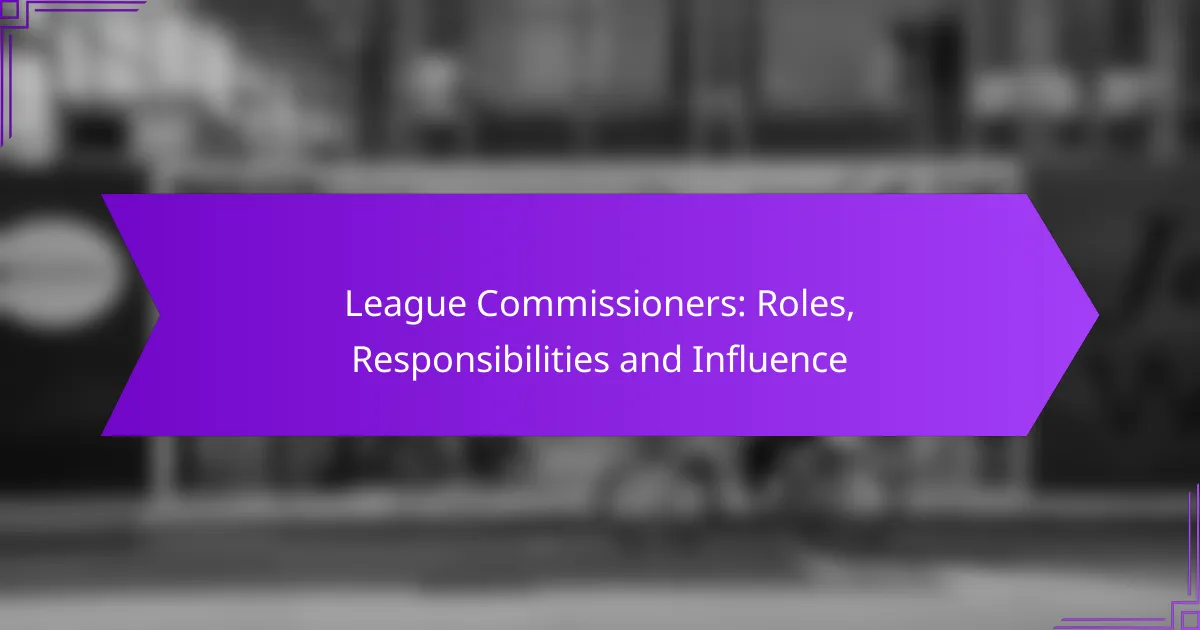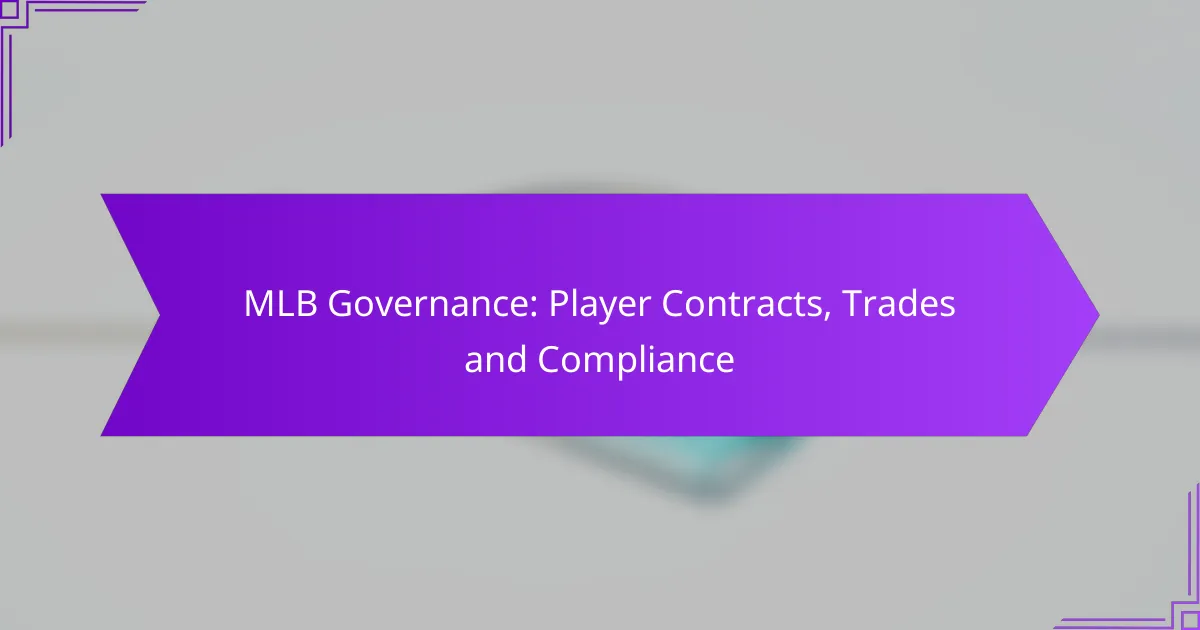League commissioners are essential figures in the governance of sports leagues, tasked with overseeing operations, enforcing rules, and ensuring regulatory compliance. Their influence extends to decision-making processes and public relations, impacting teams, players, and fans alike. By managing finances and generating revenue, commissioners play a pivotal role in maintaining the integrity and success of their leagues.
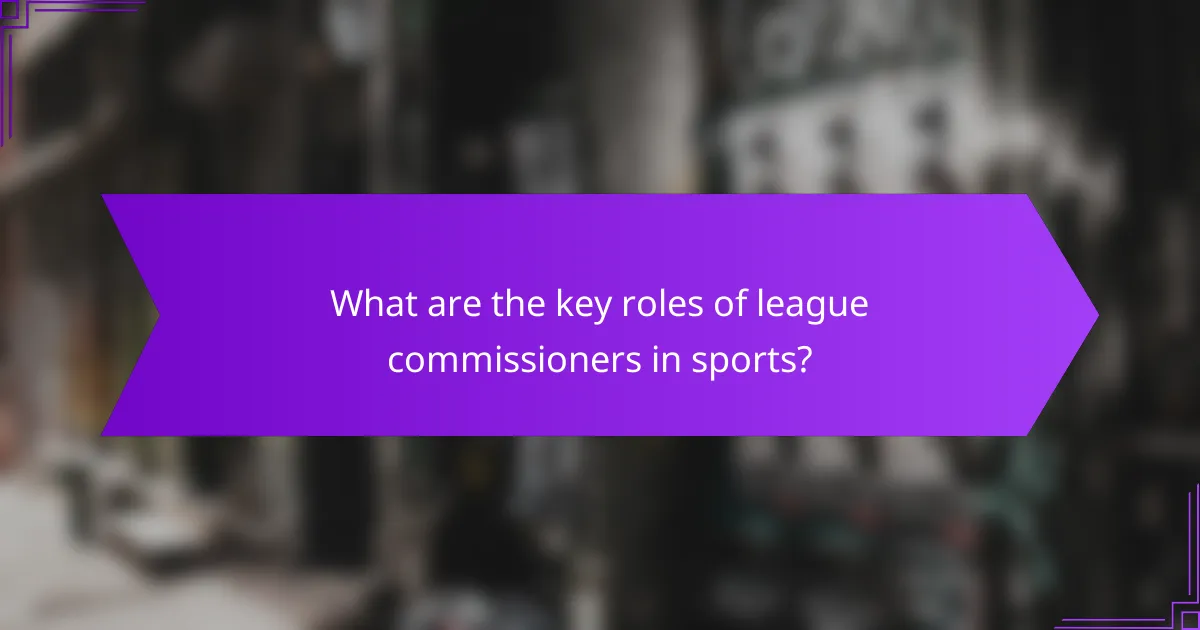
What are the key roles of league commissioners in sports?
League commissioners play a vital role in overseeing the operations and governance of sports leagues. Their responsibilities encompass regulatory authority, decision-making, dispute resolution, public relations, and revenue generation, all of which are crucial for the league’s success and integrity.
Regulatory authority
Commissioners have the power to establish and enforce the rules and regulations that govern their leagues. This includes setting standards for player conduct, game rules, and eligibility requirements. They ensure compliance with both league policies and external regulations, such as those set by national governing bodies.
For example, in the NFL, the commissioner can impose fines or suspensions on players who violate conduct policies. This regulatory authority is essential for maintaining fairness and order within the league.
Decision-making power
Commissioners hold significant decision-making power, often making critical choices that affect the league’s direction and operations. They are responsible for approving rule changes, scheduling games, and negotiating broadcasting rights. Their decisions can have long-term impacts on the league’s popularity and financial health.
In practice, this means a commissioner must balance the interests of team owners, players, and fans while making decisions that uphold the league’s integrity. For instance, the commissioner may need to decide on disciplinary actions following player misconduct, weighing public perception against league policies.
Dispute resolution
Commissioners often act as the final authority in resolving disputes within the league. This includes conflicts between teams, players, and even sponsors. They may mediate issues or impose penalties to ensure a fair resolution.
For example, if a player feels unfairly treated by a team, the commissioner may step in to investigate and determine the appropriate course of action. This role is crucial for maintaining trust and transparency within the league.
Public relations management
Managing public relations is a key responsibility of league commissioners, as they serve as the face of the league. They communicate with the media, fans, and stakeholders, shaping the league’s image and addressing controversies as they arise.
Effective public relations can enhance a league’s reputation and foster fan loyalty. For instance, during a crisis, such as a player scandal, a commissioner must communicate clearly and promptly to mitigate negative publicity and maintain the league’s credibility.
Revenue generation
Commissioners play a critical role in generating revenue for their leagues through various channels, including television contracts, sponsorships, and merchandise sales. They negotiate lucrative deals that can significantly impact the league’s financial stability.
For example, a successful negotiation of broadcasting rights can result in hundreds of millions of dollars in revenue, which is essential for funding operations and player salaries. Understanding market trends and fan engagement strategies is vital for maximizing revenue opportunities.
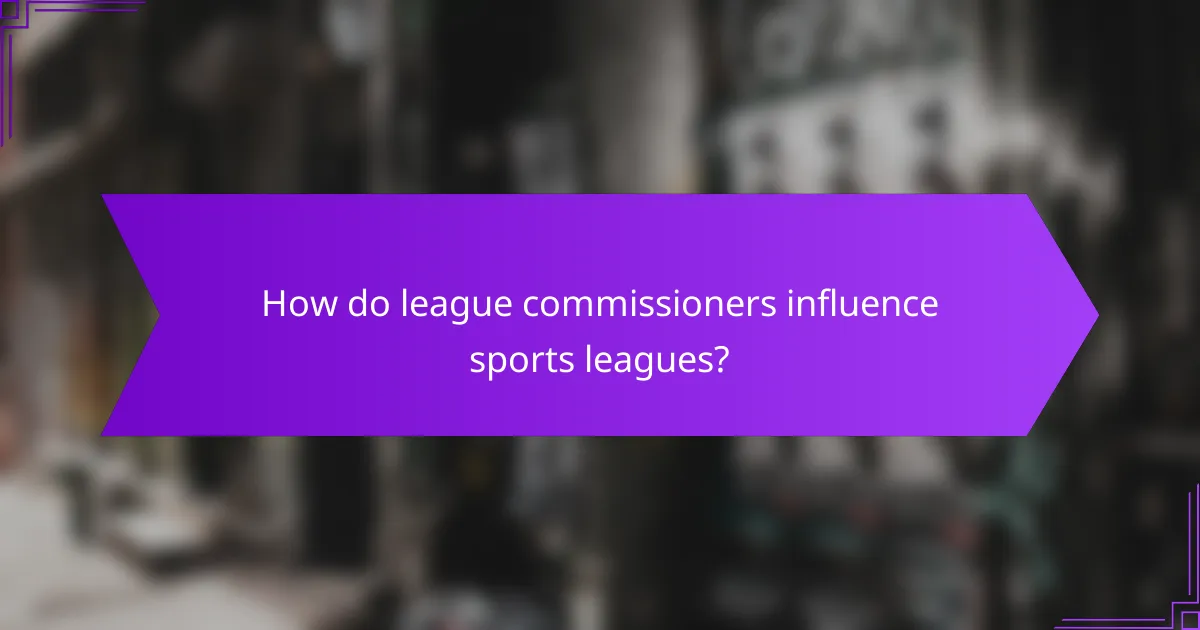
How do league commissioners influence sports leagues?
League commissioners play a crucial role in shaping the direction and policies of sports leagues. They influence decision-making processes, enforce rules, and negotiate key agreements that impact teams, players, and fans alike.
Policy implementation
Commissioners are responsible for implementing policies that govern league operations, ensuring compliance with regulations and standards. They set guidelines for competition, player eligibility, and conduct, which can significantly affect the integrity of the league.
For example, a commissioner may introduce new rules regarding player safety or game conduct, which can lead to changes in how games are played and officiated. Effective policy implementation requires balancing the interests of various stakeholders, including teams, players, and fans.
Negotiation of broadcasting rights
Commissioners negotiate broadcasting rights deals that are vital for the financial health of the league. These agreements determine how games are aired and can generate substantial revenue through television contracts.
For instance, a successful negotiation can lead to multi-billion dollar contracts with networks, significantly increasing the league’s visibility and profitability. It’s essential for commissioners to understand market trends and audience preferences to maximize these deals.
Team relocation decisions
Commissioners have the authority to approve or deny team relocations, a decision that can impact local economies and fan bases. They evaluate various factors, including market viability, fan support, and potential revenue generation.
For example, if a team seeks to move from a smaller market to a larger city, the commissioner must assess the implications for both communities. This decision often involves negotiations with local governments and stakeholders to ensure a smooth transition.
Player conduct enforcement
Commissioners enforce rules related to player conduct, which is crucial for maintaining the league’s reputation. They oversee disciplinary actions for violations, ranging from fines to suspensions.
For instance, a commissioner may impose sanctions on a player for off-field behavior that contradicts the league’s values. Consistent enforcement of conduct policies helps uphold the integrity of the sport and fosters a positive image among fans and sponsors.
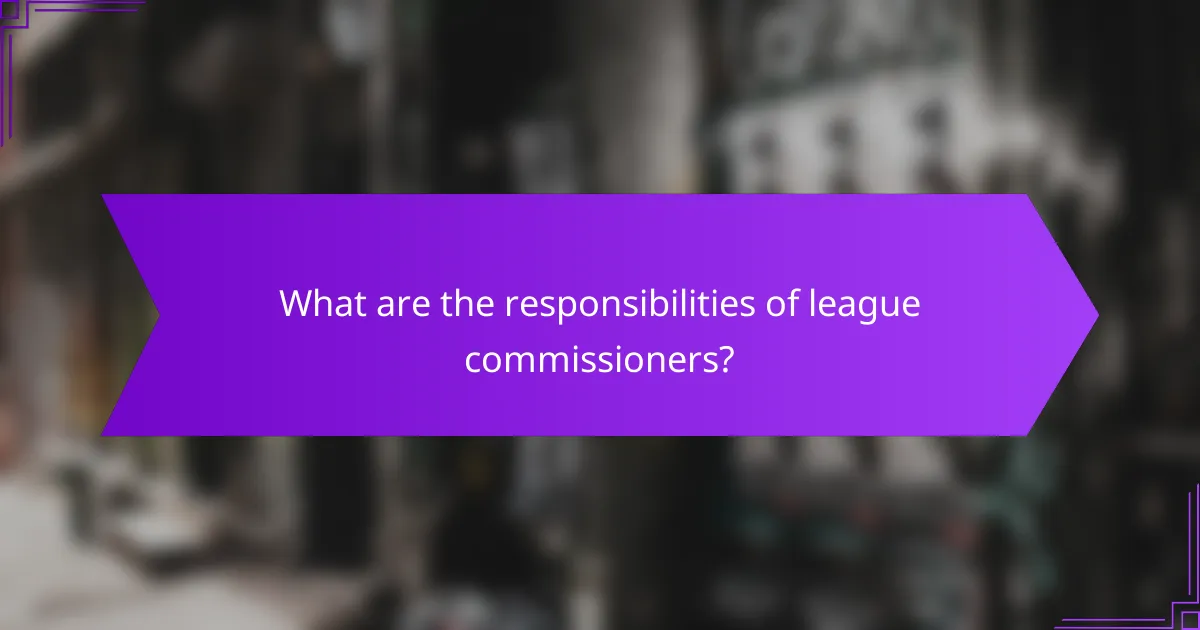
What are the responsibilities of league commissioners?
League commissioners are responsible for overseeing the operations, competitive standards, finances, and regulatory compliance of their respective leagues. Their role is crucial in ensuring that the league functions smoothly and maintains integrity and fairness.
Overseeing league operations
Commissioners manage the day-to-day operations of the league, which includes scheduling games, coordinating events, and liaising with teams and stakeholders. They ensure that all logistical aspects are handled efficiently to promote a successful season.
Effective communication is key in this role, as commissioners must work closely with team owners, coaches, and players. They often facilitate meetings and discussions to address any operational challenges that arise throughout the season.
Setting competitive standards
Commissioners are tasked with establishing and maintaining the competitive standards of the league. This includes setting rules, regulations, and guidelines that govern gameplay, player conduct, and team eligibility. These standards help maintain fairness and integrity within the league.
For example, a commissioner might implement a salary cap to ensure competitive balance among teams. They also oversee the enforcement of these standards, which may involve disciplinary actions against teams or players who violate league rules.
Managing league finances
Financial oversight is a critical responsibility for league commissioners. They are involved in budgeting, revenue sharing, and financial planning to ensure the league’s economic health. This includes negotiating broadcasting rights, sponsorship deals, and ticket sales.
Commissioners must balance the financial interests of the league with the need for competitive fairness. For instance, they may need to allocate funds to support less profitable teams while ensuring that all teams can compete effectively.
Ensuring compliance with regulations
League commissioners are responsible for ensuring that the league complies with all relevant regulations and laws. This includes adherence to labor laws, anti-doping regulations, and any other legal requirements that impact the league’s operations.
Commissioners often work with legal teams to navigate complex regulatory environments, ensuring that the league operates within the law while promoting a fair and safe environment for players and fans alike. Regular audits and reviews may be conducted to ensure compliance and address any potential issues proactively.
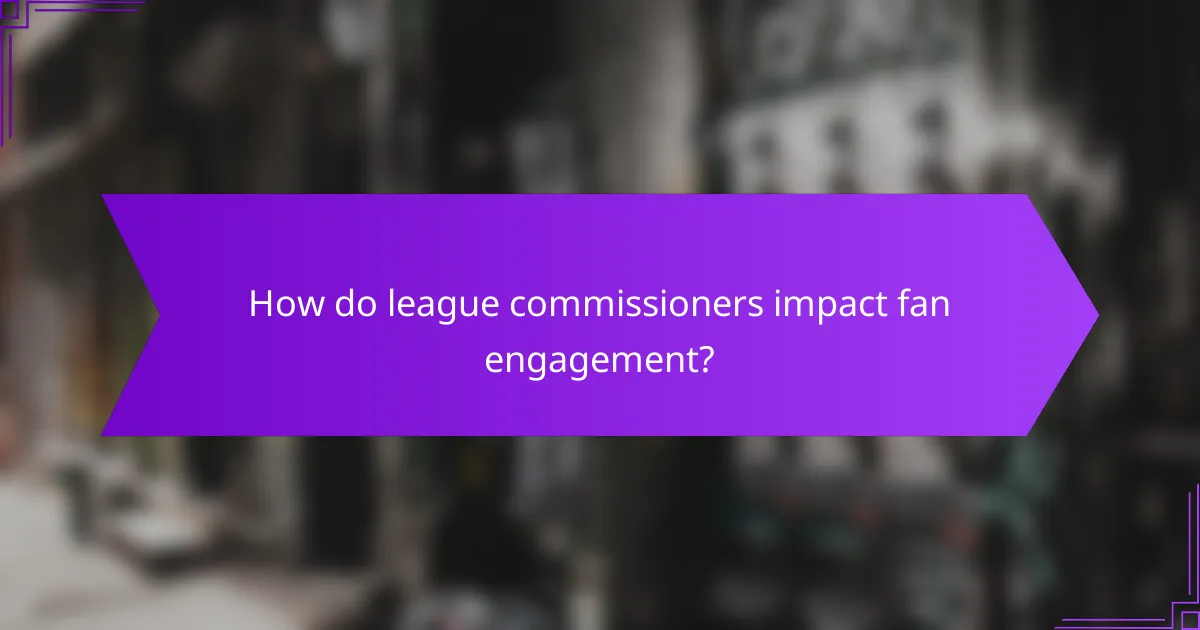
How do league commissioners impact fan engagement?
League commissioners significantly influence fan engagement through strategic initiatives that promote events, enhance the overall fan experience, and foster community outreach. Their decisions shape how fans interact with the league, ultimately driving loyalty and attendance.
Promotion of events
Commissioners play a crucial role in promoting events, which can include regular season games, playoffs, and special tournaments. They utilize various marketing strategies, such as social media campaigns, partnerships with local businesses, and promotional giveaways, to attract fans and boost attendance.
For example, a commissioner might launch a “Fan Appreciation Night” with discounted tickets and special activities to increase engagement. Such promotions not only fill seats but also create memorable experiences that encourage fans to return.
Enhancing fan experience
Enhancing the fan experience is a top priority for league commissioners, who often implement policies that improve game-day amenities and services. This can include better seating arrangements, upgraded facilities, and enhanced digital interactions, such as mobile apps for ticketing and live updates.
Additionally, commissioners may introduce initiatives like fan forums or surveys to gather feedback directly from supporters. This input helps leagues tailor their offerings to meet fan expectations, creating a more enjoyable atmosphere at events.
Community outreach initiatives
Community outreach initiatives are essential for building a strong connection between the league and its fans. Commissioners often spearhead programs that support local charities, youth sports, and educational initiatives, fostering goodwill and loyalty among the fan base.
For instance, a commissioner might partner with schools to promote sportsmanship and healthy living, engaging young fans and their families. These efforts not only enhance the league’s image but also create a sense of belonging and pride within the community.
